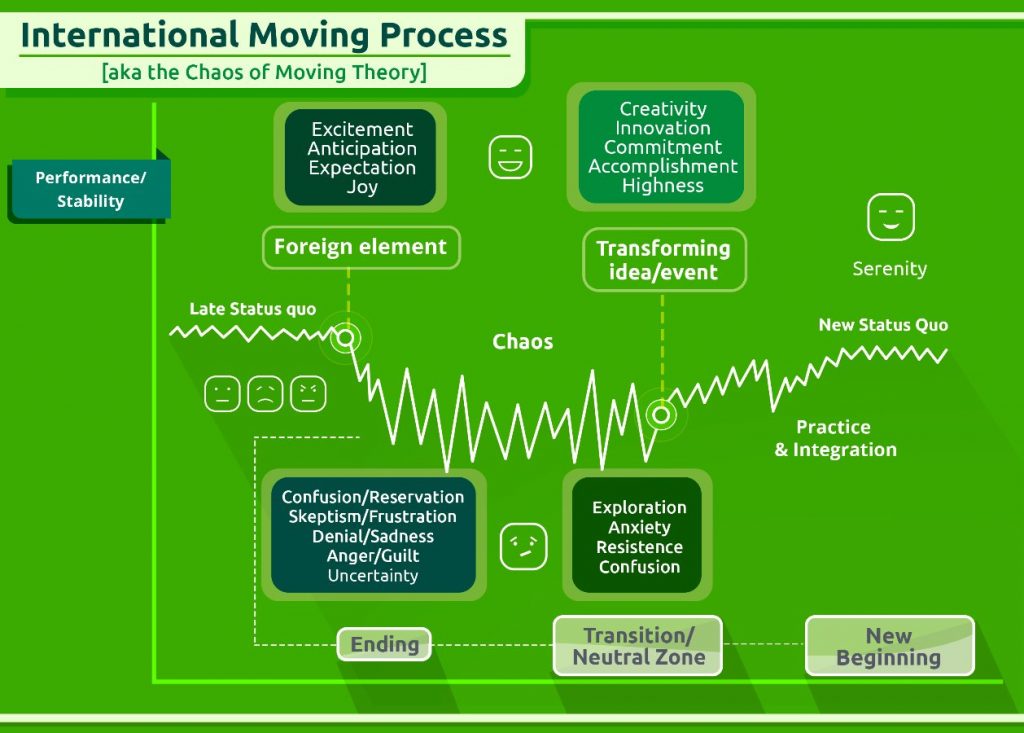What are the emotions that we go through during an international move? Have you experienced joy, excitement, sadness, fear or even grief? Or perhaps all at the same time? Because that what (often) happens during change- you go up and down between positive and negative experiences. Here’s the Chaos of Moving- Part 2.
From excitement to fear and back
Moving internationally means alternating between positive and negative emotions, sometimes within the same minute. In this graph, you will see the type of emotions associated with the different phases of transition. Above you find the positive emotions, below the more negative emotions that you may experience. And even at the end, in the new status quo phase, your days of “serenity”- being at peace with where you are- may alternate with days where you miss your old home or friends.

My first rollercoaster
Let me give you a personal example. Back in 2011, I was about to move to China with my husband but without my family, friends or a job permit. We did not know when we would move back to the Netherlands. The initial contract was for 3 years, but we were open to continuing our expat journey afterwards.
From Excitement to Negativits
I was excited about the prospect of moving, until one particular night, when I met up with ex colleagues for Christmas drinks. Instead of being excited, I found myself talking in a very negative way about what was ahead of me. I was struck by what I now call Negativitis or Moving Cold Feet.
Who understood me?
When I voiced my uncertainties to my colleagues, I was met with blank stares. Negative feelings? Why would you have that? And wasn’t I choosing this move myself? They knew exactly what they would do if they were in my position. They’d finally write that book. They’d be so happy to do nothing and relax for a year. But unlike them, I had no end date to this adventure and no clear idea about what I’d end up doing. And I hadn’t realised that new beginnings also mean endings. An ending to a life I also enjoyed, my life as I knew it.
Maybe I shouldn’t move?
I started thinking that I’d made the wrong decision to move. Something must be wrong with my decision to move, otherwise I wouldn’t have felt so negative, right?
Happy to leave again
However, I also really looked forward to starting a new life in China and the negativity passed after a few days. A week later, I found myself on the opposite end of the spectrum. When friends were saying how much they’d miss me, I felt I had to hide the excitement that I also had about moving. Because yes, I was going to miss them, but I was also looking forward to climbing the Great Wall and starting a new chapter in my life.

Endings and New Beginnings in One
International moving is an ending and a new beginning all at once. It is saying goodbye to beloved family and friends, a job, walking in the snow or having a latte at your favorite coffee outlet. And it is also saying hello to new adventures, new friends and new opportunities.
When we move, our emotions go up and down, and the degree they do depend on how hard it is to say goodbye to what we leave behind and how excited we are about what is ahead of us. In a way, I found it harder to say goodbye to Beijing a few years later than to The Netherlands. I knew I could always go back to The Netherlands if things wouldn’t work out in China, but saying goodbye to Beijing felt more definite. The chances I will ever live there again are tiny. And even then, it wouldn’t be the same. Most of my friends have already moved away from Beijing now, 2 years later.
Like I wrote before, It usually takes around 6 months to 1 year to feel settled again, both physically and mentally.
The Effects of Uncertainty
These days, many expats find themselves unsure of where they will move to next, sometimes for months at the time. For example in the oil industry, many jobs have been lost, offices are being reorganized. Employees may spend up to a year finding new employment, unsure whether they will manage to keep a job, or end up being repatriated without one. Their spouses often had to give up work when they moved abroad and now worry about the possibility of becoming the bread winner with a large gap in their CV. And how will moving or even losing a job affect the kid’s schooling, for example changing between international curriculum and a local one in a crucial time of exam preparation? These thoughts may make a period of job uncertainty very stressful.
What is there to look forward to?
Uncertainty makes it easy for the negative feelings to take over. Because what is there to look forward to? If you know your next location, you can start researching the fun things to do there, and you will look for schools and housing. Even if you have to repatriate, you can look forward to reconnecting with family and friends and familiar foods and places. You may rationalize your fears, but they are boiling just below the surface.
You will have to say goodbye to your current home, but what will you say hello to?
Tips for Managing Our Emotions During An International Move
But, like with most things in life, knowing the theory is all nice and well, but what if you find yourself in the middle of it?
The most important tips I have come across (and that have worked for me) are to
1) Acknowledge your emotions.
Rather than trying to deny, running away from or hiding our emotions, we will need to acknowledge them to ourselves. Do not unconsciously embark on the fear train without taking our suitcase full of hope for the future. Acknowledge that you may feel fear or sadness at the prospect of moving. It’s normal. And you may feel really over the moon at this new step, finding it hard to deal with everyone that says they will miss you. It is also normal. Acknowledge your feelings, it will make them easier to handle.
2) Be Grateful
Be grateful for the life you have created for yourself abroad. For the friends you have made, for the wonderful experiences you have had, the experiences you have had. Being grateful will give a deeper layer to the sadness of goodbyes. Be grateful for the opportunities that still lie ahead too. According to research among health-care practitioners, keeping a gratitude diary for two weeks produced sustained reductions in perceived stress by 28 percent.
What Emotions have you experienced while moving abroad? What are your tips to stay sane in a period of upheaval? I’d love to read your comments!




